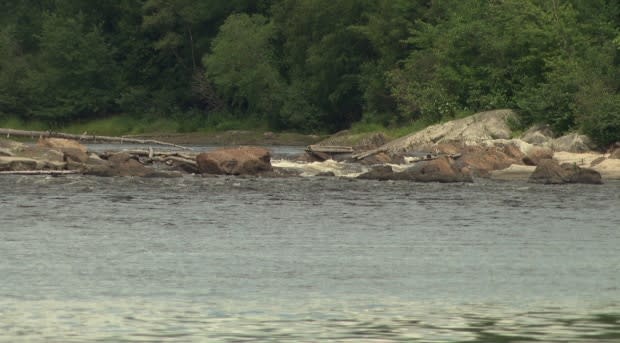Renewed push to remove slur-filled terms from Quebec's maps sparks debate
The names jump out on a map of Quebec: slur-filled terms used to describe rivers, hills and lakes across the province.
But a renewed push to remove offensive names from Quebec's toponymy has sparked a debate about the best way to remember the history of Black people in Quebec.
Rekeisha George, who launched a petition last week to change all the province's place names that include the N-word in English and French, says she was enraged to see the offensive words on Google Maps — all while Premier François Legault continues to deny there is systemic racism in Quebec.
"It's not a place that I would feel comfortable to go and take a stroll," said George, a Pierrefonds woman who is Black.
"It makes my skin crawl."
In response to a 2015 petition, Quebec's toponymy commission removed 11 offensive names from all official maps of Quebec. Five years later, only one has been renamed — Lac Honoré-Gélinas in Shawinigan.
That means private maps, including Google Maps, can still display the offensive titles.
"The commission, which has no legal authority to compel private map publishers, has repeatedly asked Google to remove the names, but without success," said spokesperson Chantal Bouchard.
There is no mention of the former racist name of Lac Honoré-Gélinas on the toponymy commission's website.
The commission says it's working to rename the other 10 locations.
George, who joins many around the world calling for statues of racist historical figures and racist names to be removed, says that's not enough.
"We need to find a way to make whoever is in charge of changing the name to actually finish the job," George said.
She acknowledged the importance of preserving the history of these locations, suggesting renaming them based on the people who lived there "and not using a word that's offensive to people."
'The only evidence that Black people even existed'
Some of these locations, including N-word Rapids near Gatineau, named for a Black couple who drowned there, and a hill 50 kilometres south of Montreal, reflect known places where Black people — including slaves — lived in Quebec.
Dorothy Williams, a historian who specializes in Black Canadian history, says these places were named by white people signalling to other white people that Black people were there at some point in history.
Though she acknowledges how offensive the names are, removing them would be an erasure of the already limited amount of tangible Black history in Canada, she said.
"Who's going to know that Black people were even there?" Williams said.
"That is the only evidence that Black people even existed, that they even had an imprint in that part of Quebec."
Williams says she hopes there will be research in those areas to find out more about the histories of the Black people who lived there before the names are changed.
"It's still a representation," she said. "Wait [until] we have time to really understand, and help the rest of Quebec say, 'Look, this is your history.'"

Gabriel Bazin of the Black Coalition of Quebec echoed Williams's points.
His group has, in the past, argued that N-word Rock, a cemetery near the United States border where Black slaves are believed to be buried, should formally be recognized as a historical site.
Several Loyalist families leaving the United States brought slaves with them when they settled near Saint-Armand, Que., around 1784, according to the Black Coalition of Quebec.
Saint-Armand is about 83 kilometres south of Montreal.
Keeping the names prevents erasure of Black history, Bazin said.
"It shows that Canada had slaves. It shows the pain of those people — the suffering of those people," Bazin said.
He says there are other issues, such as police brutality against Black people, that need to be addressed.
"Justice is more important than names," Bazin said.
Gaps in Canada's Black history: McGill art historian
Charmaine Nelson, a professor of art history at McGill University, says the names should be stripped — but there should be archival context put in place by the government to remind future generations that racist names were once there.

She says Black history in Canada is focused on the 32-year existence of the underground railroad, which brought slaves north to freedom, but the 200-year history of slavery in Canada is rarely acknowledged.
"Canadians are very good at saying, 'It never happened here,' meaning imperialism, colonialism, slavery, et cetera," she said.
Canada's dismissal of that reality affects Black Canadians to this day, she said.
"If you just completely remove the names of the sites, that actually contributes to that," Nelson said. "We have to think: Remove and replace with what? Remove and remember how?"
Nelson said the places should commemorate the people whose history is reflected in the names, by erecting a monument to people of African descent, for example.

